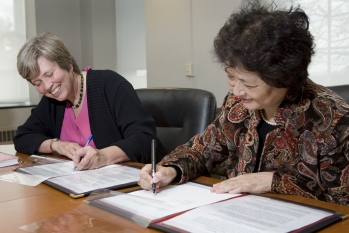ENDNOTE
Why global engagement is a core value of this university

Alice Pell, vice provost for international relations, left, and Zhang Jishun, president of university affairs at East China Normal University in Shanghai, sign an agreement in Day Hall last October. See larger image
"Internationalization" is a current buzzword in higher education. Around the world, universities are developing strategies to ensure that students can study overseas and ensuring that there are agreements with foreign universities to encourage international research, that the student body has "passport diversity" and that graduates have skills that will permit them to work in culturally and linguistically diverse situations. How do Cornell's international programs compare with those of our peers? What must we do to ensure that our programs are strong and effective?
Unlike many American universities, Cornell has made international engagement an integral part of its heritage since the founding of the university in 1865. Cornell's first graduating class in 1869 included students from Russia, Canada, England and Brazil. During the late 19th century, there were so many Brazilians at Cornell that a Portuguese language journal, Aurora Brazileria, was published regularly on campus. Cornell's international involvement increased in the early 20th century when many Chinese students came to Ithaca. Sao-ke Alfred Sze, Class of 1902, later became China's ambassador to the United States. The contributions of these early Chinese Cornellians ranged from modernization of agriculture (Hing Kwai Fung, 1911) to reform of the Chinese language (Hu Shih, 1914) and building of the Chinese railroad system (S.C. Thomas "Tommy" Sze, 1905). In the 1920s, Cornell became actively involved in programs overseas by participating in the Cornell-Nanking Crop Improvement program. This initiative resulted in development of high-yielding varieties of rice, wheat, cotton and other staple crops, and the training of a generation of Chinese plant breeders, who made continued progress after Cornell's involvement ended.
The legacy of Cornell's international tradition is profound; global engagement is a core value of the university. However, valuing global research, teaching and education is different from delivering world-class international programs. Increasingly, we need interdisciplinary efforts at the policy and grassroots levels to address complex problems. Current initiatives in the Nile basin provide a good example. Faculty members in the Law School are involved in updating treaties from 1929 and 1954 to allocate river water to Egypt, Sudan, Ethiopia and other east African countries, while students and professors from Arts and Sciences are contributing political perspectives, language expertise and understanding of cultural and historical contexts. The College of Engineering and the College of Agriculture and Life Sciences are investigating the implications of different watershed management regimes for efficient and sustainable water use. The Center for Sustainable Global Enterprise in the Johnson School has studied how to improve water access for the poor. These collaborations have resulted in a course jointly taught by faculty in the Law School, Arts and Sciences, Engineering and CALS. The success of the Nile program depends on top-notch disciplinary expertise and strong linkages across academic fields to generate effective policies and technical solutions to problems as important as water access.
Like most top universities in the U.S., Cornell is highly decentralized, largely because the most talented faculty members are drawn to institutions that give them autonomy over their research and teaching programs. As a result, most of Cornell's international programs are externally funded and faculty controlled. This local control fosters innovation and faculty initiative, but the university runs the risk of balkanization with numerous small, unconnected international programs. How can we retain programmatic excellence while encouraging collaborations across departments and colleges?
Cornell is currently involved in a universitywide strategic planning initiative that will include our international programs. Where should we work? What international programs should the university undertake? How can the university support them better? How can we take advantage of the breadth of Cornell's academic offerings without losing focus? How do we create a campuswide web to ensure that students and faculty are aware of programs in all corners of the university? As you read the articles in this issue of Ezra, please consider these questions. We welcome your suggestions as we design international programs for the 21st century.
Alice N. Pell is professor of animal science and Cornell's vice provost for international relations. She is former director of the Cornell International Institute for Food, Agriculture and Development. Contact her at ap19@cornell.edu.